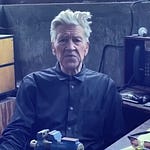‘All that you touch/You change/All that you Change/Changes you/The only lasting truth/Is Change/God is change. EARTHSEED: THE BOOKS OF THE LIVING’
from The Parable of The Sower by Octavia Butler
At the end of this dispatch you’ll find depth writing prompts to channel your creativity & expand your sense of possibility. You can interpret the prompts any way you wish. You might want to do them now or when you have a quiet moment later on. You can do them on your own or with a friend. Or you can join a workshop on Monday September 16th 7pm-8.15pm GMT to do the writing prompts with others in a friendly & supportive online space.
Free subscribers - book your place here
Paid subscribers - RSVP to attend and/or use the link at the bottom of this post.
Read on or listen to the audio to explore:
Octavia Butler’s prophetic 1993 novel The Parable of the Sower & why it speaks to ‘the long dark’ of now
How we can be hero/ines - not just for one day
The transformational role of writing in shaping reality
Art work: Manzel Bowman.
The journey begins
‘All struggles/ Are essentially power struggles… and most are no more intellectual/ Than two rams/Knocking their heads together’ - Earthseed: The Books of the Living
Back in the early nineties before the ‘war on terror’, before the financial crash, before reports of wildfires became everyday news, before the forced displacement of hundreds upon millions, before the systemic rollback of basic human rights. Before we woke up one morning and wondered where have all the butterflies gone?
Back when Gen X (that’s me) were whipping ourselves into a trance to Nirvana’s Smells Like Teen Spirit and KRS-One’s Sound of Da Police, raging ecstatically against a machine whose death dealing tentacles still seemed far away enough in the future that - if you were privileged and western and white (also me) – it was still possible to believe their threat could be averted if you were smart enough and took the right coloured pills.
Back when Tony Blair and Bill Clinton arrived on the scene to captain a shiny new era of can-do centre-left positivism, the black American science fiction writer Octavia Butler was looking out of her Los Angeles window and noticing a few things.
She was noticing rising populations and a corresponding rise in the number of cars. She was noticing the trees in her neighbourhood and how some were dying alongside the ‘ecological craziness of all kinds’ she was seeing in the news. And she was noticing the ‘pretty lies’ of the ‘pretty’ politicians and how all the heroes were mostly male and white.
Octavia wasn’t only paying attention to the present, she was also looking back to the slavery and colonialism of America’s past.
Putting past and present together, Octavia began writing a novel set in the future. The world she chose for this novel, which she would call The Parable of The Sower, was a dystopian California where the trees are dying, the water is running out and the state is in a perpetual drought.
Octavia’s imagined California is a desolate near hell inflamed with poverty, violence and paranoia. Beleaguered communities are kept at each other’s throats by a Christian fundamentalist president whose election slogan is ‘Help us make America great again’. All roads out of town are overflowing with the destitute, homeless, hungry and sick. No one is safe from the shaven-headed, painted ‘pyros’ who roam at night burning whatever – and whomever – they please.
Although The Parable of The Sower was published in 1993, if all this sounds familiar that’s because the year the story begins is right here in 2024.
Too big to not fail – how we got into collapse
‘When civilization fails to serve, it must disintegrate unless it is acted on by unifying internal or external forces’ - Earthseed: The Books of the Living
In the intervening years a growing number of experts, like Octavia back in the early nineties, have also been noticing a few things - as journalist Sarah Wilson is busy documenting in her book serialisation
. These things include but are not limited to increasing global levels of climate stress, malnutrition, starvation, disease, conflict and war, alongside unsustainable growth and the dizzying complexity with which they are all locked together.Unsurprisingly, what these experts are noticing is exactly what we don’t really want to see. And what the majority in power are choosing not to see. Which is that collapse is happening now, everywhere, all at once.
The psychotherapist Francis Weller and former pupil of Joseph Campbell (author of Hero With A Thousand Faces, an account of the hero’s journey directly influenced by Carl Jung) calls this collapse ‘the long dark’.
In Jungian terms the long dark or collapse we’re in now suggests a total dissolution of the old order, the old way of doing things that is both as painful, as it as arguably inevitable, as it is part of an eternal, ongoing cycle of loss and renewal which the whole cosmos has been caught up in since the death of the first star.
According to Weller; ‘We are seeing this last gasp effort to try to uphold the old structures. Keep capitalism going. Keep the stock market inflated. They’re all going to collapse. They have to because the system . . . is unsustainable. Not only in terms of world resources, but just in terms of human capacity to endure that kind of emptiness.’
Although The Parable was written in the past, it’s since acquired the prophetic numinous charge of a pre-cognitive nightmare about the ‘orgies of dying’ (as Octavia put it) happening right now - not to mention a possible America under a second Trump presidency in the very near future.
As I sat down to read it and things grimly marched from bad to worse to catastrophic – in both the novel and the news - I found myself asking, what would I do if I lost everything? What would I take on the road? How might I survive? Terrifyingly, would I?
A new kind of hero/ine for a new kind of task
All successful life is/adaptable/opportunistic/ tenacious/ interconnected/ fecund/ Understand this/Use it Shape God’ – Earthseed: The Books of the Living
Psychologically speaking, the hero archetype is an essential stage of ego-development which requires us to leave the safety of the home - including our first home, the womb - in order to break free of our parent’s hold and discover our gifts without being overwhelmed by the dragons of our unconscious as they, too, break free and take on a life of their own. The hero is associated with so-called masculine qualities of courage, confidence and ambition. It’s with this energy that we get things done, set and achieve goals and establish healthy boundaries. But what about a hero/ine for the long dark now? Does the old motif still apply?
Octavia said, ‘there is nothing new under the sun but there are new suns’. Through Lauren, the lead character in The Parable, Octavia has created a new sun, a new type of hero/ine, fit for this new age of collapse. Firstly, Lauren is a tall, androgynous girl of fifteen. Secondly, she is African American. But like all good heroes Lauren has a robust ego. This gives her the confidence to reject her father’s Christianity and invent her own religion which she calls Earthseed. When the novel opens, Lauren is also busy skilling up while everyone else is carrying on as normal, ready for the day she knows is coming when she will need to leave home as a matter of survival.
But if Lauren is self-sufficient, ego-oriented, determined and strong, she is also able to act in a way that is strikingly ego-less. While the over-adapted ego (that’s most of us living under capitalism) doesn’t like change and will do anything to avoid it, Lauren makes change the god of her religion.
Equally stable and flexible, self-assured and self-emptying, masculine and feminine, Lauren is a new kind of hero/ine expansive enough to be both sower and seed. Attuned to others, Lauren is a ‘super feeler’, capable of sensing their pain as if it’s her own. Unlike the traditional hero who goes it alone, Lauren chooses community over isolation, diversity over tribalism and solidarity over difference. She embraces the ‘other’ as herself. Nothing and no one is excluded, no matter how difficult, uncomfortable or dark.
As I read on, I began to understand The Parable as a clear set of instructions for collapse now. As writer, activist and erstwhile founder of Octavia’s Brood, adrienne maree brown says in conversation with
.“All organizing is science fiction, right? It’s like… we are trying to project what we can imagine into the future…We are going to get involved and shape it into something that we can all be in.”
Which is an invite to ask, how can we follow in Octavia’s footsteps? How can we apply her instructions in order to be hero/ines in a time of the long dark now?
We change through writing
‘We are Earthseed/the life that perceives itself/changing’ – Earthseed: The Books of the Living
Like her creator, Lauren is both a warrior and a writer. Indeed, The Parable is written in the form of Lauren’s journal accounts of the trials and tribulations she faces while seeding community and fending off pyros out on the road. Meanwhile The Books of the Living appear in the novel fully formed - a book within a book that gives flight to Lauren’s imagination and dreams while acquiring a life of its own. Taken together, the reflective life writing of Lauren’s journal combined with the creativity and inventiveness of the Earthseed books perfectly example the process and goal of depth writing.
So, we change through writing. Writer to reader. Reader to world. World to writer. We shape reality. Reality shapes us. Forever flowering and fading. Contracting. Expanding.
Writing is change.
If you enjoyed Kill The Monster, Sow The Seeds, please do ‘heart’ & share so that others can find it – thanks so much!
Let’s talk collapse, change & writing in the comments below
Who/what is your god?
What does collapse mean to you?
How have you changed through writing?
Depth writing prompts
Write a response to one or more of the verses from Earthseed: The Books of The Living quoted above.
Reflect - What situation is demanding change in your personal life and/or collectively? What do you need to leave behind? What do you need to pack for the road? Who will you travel with? What kind of community do you want to be part of?
Write your own short parable, motto, slogan or verse for an age of collapse. If you’re feeling bold, invent your own religion.
Depth-Writing Workshop - Monday September 16th, 7pm-8.15pm GMT
Press pause on the busyness of life, connect with others and, most importantly, have time just for yourself to write in response to this month’s prompts. You are don’t need any writing experience to join and there will be no pressure to read anything out. All you need is a spirit of adventure and curiosity!
Free subscribers book your place here
Paid subscribers RSVP to this email and/or join with the zoom link in the footer below.
N.B. Although depth-writing is therapeutic, it’s not therapy, so let the words lead but only as far as want to go.














Share this post